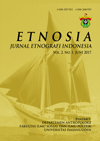Abstract
Ranger pink is the term used to refer to women who works to operate dump truck in mining area of Sorowako. Despite the fact that operating dump truck is a hardwork since it operates a big equipment in open space area and sometimes in a night shift, women get involved in such kind of work, and called ranger pink. This article aims to explore how ranger pink manage to live their two completely different world, at work and at home. It was discovered that recruitment process, working activities, as well as working shift are genderless. However, the company has specific policy in regard to women which deal with their reproductive health and facilities for ranger pink who are in the night shift work. Working as ranger pink has given significant change in their life. The family pays more attention to ranger pink, they get involved in the decision making in the family, they can help the family economically, and increase social status of the family. Ranger pink try to balance between her work and her domestic activites with the help of the husband and/or other members of the family. In spite of the fact that ranger pink are welcome by their male dump truck operator, they are also criticised in participating in such work, and suggesting to have other ‘normal work’ for women. Ranger pink are also criticised by the surrounding community because of their participation in such kind of work, especially because their best place is at home to take care of their children. Therefore, women are to be blamed when something happen to children.References
Botha, Doret. (2016). Women in Mining Still Exploited and Sexually Harassed, www.sajhrm.co.za, diakses tanggal 29 Oktober 2017.
Giddens, Anthony. (1987). Kelompok, Kekuasaan, dan Konflik. Jakarta: Rajawali.
Kusumah, S. Dloyana. (2010). Pembentukan Norma & Nilai Baru dalam Pranata Keluarga, Studi tentang Peran Ganda Perempuan di kelurahan Cibaduyut. Yogyakarta: Kepel Press.
Mlambo, Yeukai. (2011). Women in Mining: Legislation and Representation for Women in Mining.m.polity.org.za, diakses tanggal 29 Oktober 2017
Rabudianto, Tyas. (2015). Mine and Exploration Department PT. Vale Indonesia, Tbk. Sorowako: PT.Vale Indonesia, Tbk.
Riskiyani, Shanti. (2016). Feels (Not) Like at Home: Perlakuan di Lapas, Interaksi Sosial, dan Harapan Pengguna Narkoba Mantan Narapidana. Etnosia: Jurnal Etnografi Indonesia. 1(1):71-84.
Robinson, Kathryn M. (1986). Stepchildren of Progress: the Political Economy of Development In an Indonesian Mining Town. New York: State University of New York Press.
Santi, Budie. (2003). ‘Langkah-Langkah Perempuan Di Pertambangan’, Jurnal Perempuan, 27:31-52.
Undang-Undang Republik Indonesia Nomor 4 Tahun 2009 tentang Pertambangan Mineral dan Batubara
Undang-Undang Republik Indonesia Nomor 13 Tahun 2003 tentang Ketenagakerjaan.
Vale. (2014). Melangkah Pasti dengan Keunggulan Operasional untuk Meraih Kemajuan Bersama. Sorowako: PT.Vale Indonesia, Tbk.





